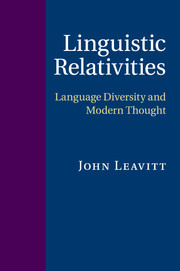Book contents
- Frontmatter
- Contents
- Preface
- Introduction
- 1 A passage to modernity
- 2 One reason, one world, many monads
- 3 The world at war with reason: Britain and France in the eighteenth century
- 4 Multiplicity and the Romantic explosion
- 5 Essences and universals through the nineteenth century
- 6 Boas and the linguistic multiverse
- 7 Linguistic relativity: Sapir, Lee, and Whorf
- 8 The other side of the mirror: a twentieth-century essentialism
- 9 The rise of cognition and the repression of languages
- 10 The return of the repressed
- Conclusion
- Notes
- References
- Index
9 - The rise of cognition and the repression of languages
Published online by Cambridge University Press: 04 April 2011
- Frontmatter
- Contents
- Preface
- Introduction
- 1 A passage to modernity
- 2 One reason, one world, many monads
- 3 The world at war with reason: Britain and France in the eighteenth century
- 4 Multiplicity and the Romantic explosion
- 5 Essences and universals through the nineteenth century
- 6 Boas and the linguistic multiverse
- 7 Linguistic relativity: Sapir, Lee, and Whorf
- 8 The other side of the mirror: a twentieth-century essentialism
- 9 The rise of cognition and the repression of languages
- 10 The return of the repressed
- Conclusion
- Notes
- References
- Index
Summary
Sapir died in 1939, Whorf in 1941, Boas in 1942. Dorothy Lee published some papers on language and world view after this time, as did Harry Hoijer (1904–1976), who worked primarily on Athabaskan languages, notably Navajo (discussion of his work in Lucy 1992a: 75–82). A collection of Sapir's papers was published in book form in 1949, some of Whorf's in 1952, with the definitive volume of his papers appearing in 1956. But that was pretty much it. From the 1950s on, the scholarly world would be going in a direction hostile to relativist ideas.
The cognitive revolution
Much of American academic thinking from the 1920s on accepted the behaviorist assumption that the mind was an inaccessible black box, and therefore that the only thing one could study scientifically was externally observable behavior. In linguistics, the shift in emphasis from Sapir's culturally connected and open linguistics to the much more limited descriptive analysis of his Yale colleague Leonard Bloomfield (1887–1949) took place the 1930s. Bloomfield had experienced a conversion to behaviorism: language was to be redefined as verbal behavior (Bloomfield 1933). He and the several generations of American linguists who followed him sought to create a science of pure description. One result was that linguistics as a separate field grew closer to psychology and farther away from anthropology, which maintained an interest in questions of meaning and context.
- Type
- Chapter
- Information
- Linguistic RelativitiesLanguage Diversity and Modern Thought, pp. 165 - 188Publisher: Cambridge University PressPrint publication year: 2010



